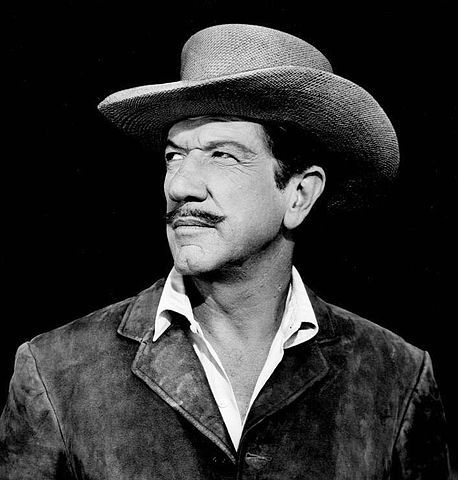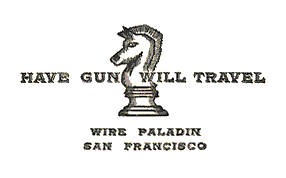"Wire Paladin, San Francisco"
Nov 23, 2017
In the latter days of the Golden Age of Radio, several programs made the move to television - chasing advertisers and the public’s focus. Dragnet aired on radio and TV simultaneously for years, along with comedies like Our Miss Brooks and The Jack Benny Program. Generally, it was a one-way street, but in 1958 CBS reversed the trend when it brought its hit TV western Have Gun - Will Travel to radio.
The series premiered on television in 1957. Created by Herb Meadow and Sam Rolfe (The Man from U.N.C.L.E.), the series starred Richard Boone as Paladin, a suave but deadly gun for hire. Educated at West Point, Paladin operated out of the luxurious Carlton Hotel in San Francisco. He was aided by hotel bellhop Hey Boy (Kam Tong), and he advertised his services with his trademark card, bearing the words “Have Gun - Will Travel.”
Off duty, he enjoyed fine cigars, good drinks, and the company of lovely women. But when he was on the job, Paladin dressed in black and had nerves of steel. The series successfully blended two of television’s most popular genres: the western and the private eye series. It wasn’t as if Paladin was Sam Spade on horseback, but he was tough, resourceful, and worked by his own moral code. He’d take on dangerous jobs for the right place, but he would turn the tables on his employer if Paladin discovered he was being used. Boone was simultaneously debonair and dangerous as Paladin. The role earned him two Emmy nods and he directed several of the episodes. One of the show’s most prolific writers was Gene Roddenberry; less than ten years later, he’d bring Star Trek to television. Have Gun - Will Travel had a comfortable home in the top five on the Nielsen charts for its first four seasons on the air.

The radio version of Have Gun - Will Travel had connections to the radio and TV versions of another classic western. Producers brought Gunsmoke to television in 1955, but producer Norman MacDonnell - who, along with writer John Meston had made the radio series one of the finest programs on the air - was largely shut out of the TV series. When CBS planned to bring the adventures of Paladin to radio, MacDonnell campaigned for - and won - the job. Actor Ben Wright, who co-starred as Hey Boy on radio, said “There were definite ill feelings between Norm and the television crew responsible for Gunsmoke. I think Norm came up with the idea for doing a radio version of Have Gun, possibly to show them that ‘Hey, look what I can do with your program, and I did it even better.’”
When it came to casting the radio voice of Paladin, producers did not import the series’ television star. Instead, they tapped an actor who had only recently wrapped a run on another western program. John Dehner was one of the busiest radio actors in the 1950s, frequently guesting on Escape, Suspense, and - for Norman MacDonnell - Philip Marlowe and Gunsmoke. In fact, Dehner had been offered the role of Matt Dillon on Gunsmoke, but he turned it down. From February until November 1958, Dehner starred in Antony Ellis’ acclaimed drama Frontier Gentleman as British newspaper correspondent J.B. Kendall. It was a drama in the “adult western” vein of Gunsmoke, but it left the air in November. The week after J.B. Kendall filed his last report of the west, John Dehner was on the air as Paladin.

Dehner sought to create his own version of Paladin, commenting “I didn’t pay any attention to [Richard Boone] at all. I knew it would be deadly if I were to imitate him or do anything that was even vaguely similar to him.” He made the role his own, creating a Paladin who sounded just as home in an opera box as he did on the trail. Each episode opened with Bernard Hermann’s driving theme (imported from television) and Dehner as Paladin delivering a line from the story to follow.

Have Gun - Will Travel offered a showcase for some of radio’s greatest players as the era of radio drama was winding down. Harry Bartell, Larry Dobkin, Virginia Gregg, Jeanne Bates, Howard Culver, and many more (most of them members of MacDonnell’s repertory company) turned in supporting performances in a mix of adapted television scripts and original stories.
On television, Paladin continued to hire himself out until 1963, but his radio series ran for 106 episodes. Have Gun - Will Travel left the air just over two years after it premiered and just about two years away from the end of the Golden Age of Radio. In the final episode, Paladin left San Francisco behind and rode to Boston to claim an inheritance. Just as he reversed the trend and rode to radio, Paladin defied his genre and rode east at the end of his story.


